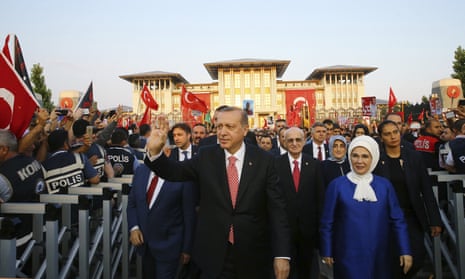Imagine you are making a late-night call to your significant other and your president answers the phone instead. Last Saturday every Turkish citizen was obliged to listen to Recep Tayyip Erdoğan’s failed coup anniversary message on their mobile phone before moving on to their actual call. He was once again reminding the country of his omnipresence – in case any citizen could forget it for a moment.
This year, those who are not Erdoğan’s supporters arranged their holidays carefully in order to skip last weekend’s celebrations in Istanbul. Anyone living in a country with issues of rising populism or authoritarianism will recognise the feeling of helplessness in the face of invasive and blunt lying by the ruler who constantly invents new enemies to sustain his power. Some of those who couldn’t arrange to be away simply turned off their TVs before Erdoğan made his speech.
But for those of us who watched him declare, “We are going to cut the traitors’ heads off”, and the crowd chant back, “We want execution!”, it was one of the countless moments when we asked ourselves: “Are these my people? Is this my land?” When manufactured hatred turns your country into a hive of hostility, you feel homeless.
Erdoğan’s answer to such questions is very clear. The anniversary was a declaration that the old Turkey has been replaced by Erdoğan’s Turkey. He even declared that the population had shrunk by 30 million. “We rescued the 50 million on the night of the coup,” he said. Turkey’s population is 80 million.
The Turkish flag was replaced with a new symbol featuring 15 July. The national anthem has virtually been replaced with Dombra, the campaign song of the ruling Justice and Development (AKP) party, with its chorus “Recep Tayyip Erdoğan” repeated 10 times. Thanks to emergency rule, extended again a few days ago, the already crippled judicial system has been further weakened. Since the dubiously conducted referendum for the presidential system in April, the parliament has in effect been replaced by Erdoğan’s lavish palace as the seat of political power – which he considers quite humble compared to Buckingham Palace.
All the complexity of Turkish politics has simultaneously been reduced to the most banal polarisation. The tension between Kurdish and Turkish, Sunni and Alevi or left and right has been reduced to a single split: between Erdoğan’s devout supporters and the “traitors” who now include even teenagers being investigated for critical tweets.
Meanwhile the de facto replacement of the secular system with an Islamic one was symbolically marked by Qur’an recitation during the anniversary ceremony in parliament. What little comfort the 30 million Turks regarded by Erdoğan as not existing can find comes in depressed jokes on Twitter, or in their private WhatsApp groups.
In Turkey, the age of post-truth is not a sophisticated one. What started as subtle bending of the facts to create handy truths for the ruling party has become crude lies, rubbed in your face. When more than 2 million people gathered in Istanbul under the banner of “Justice” on 9 July following a protest march from Ankara, Erdoğan insisted that the crowd numbered just 145,000, despite the whole nation having watched the rally on TV with their own eyes. As the oppressed media reluctantly repeated Erdoğan’s figures, Turks learned yet again that it is no good having eyes when you cannot express what you see.
Today, many are reluctant to make predictions about Turkey’s future simply because it is so deeply painful to voice our fears. Since formal political opposition has become virtually impossible, the half of the population that opposes Erdoğan is left with only one option: street politics. And Erdoğan has insinuated several times that if people take to the streets, the outcome could be far bloodier than the crackdown on the Gezi protests of 2013 that left several dead and more than 8,000 severely injured.
Nobody wants to imagine a confrontation between the more educated half of the country and the mob chanting, “We want execution!” whenever Erdoğan points out a new enemy as a means of consolidating his power. We are talking about a crowd that truly believes this week’s flash floods in Istanbul were caused not by poor infrastructure resulting from is not because of years of nepotism and corruption, but by a treacherous plot orchestrated by the opposition.
“May God protect us from the evils of the educated,” said the imam last year during the symbolic funeral laid on by the government for those who lost their lives resisting the coup. The supporters of Erdoğan answered: “Amen.”
The past year has been about removing educated people – teachers, lecturers and others – from the public sphere, but has also seen an attempt to suppress or kill off the basic human capacity to reason. The result is Turkey is at the mercy of Erdoğan’s state of mind. His state of mind is one in which he genuinely sees no reason why there should be other voices than his.
Like many other people in Turkey, I feel like part of a radio that has been taken apart and reassembled by a novice repairman. We are the component that has been left out. Obviously the machine is not working any more. We wonder when this painful truth will be recognised – or if it will ever be recognised at all.
